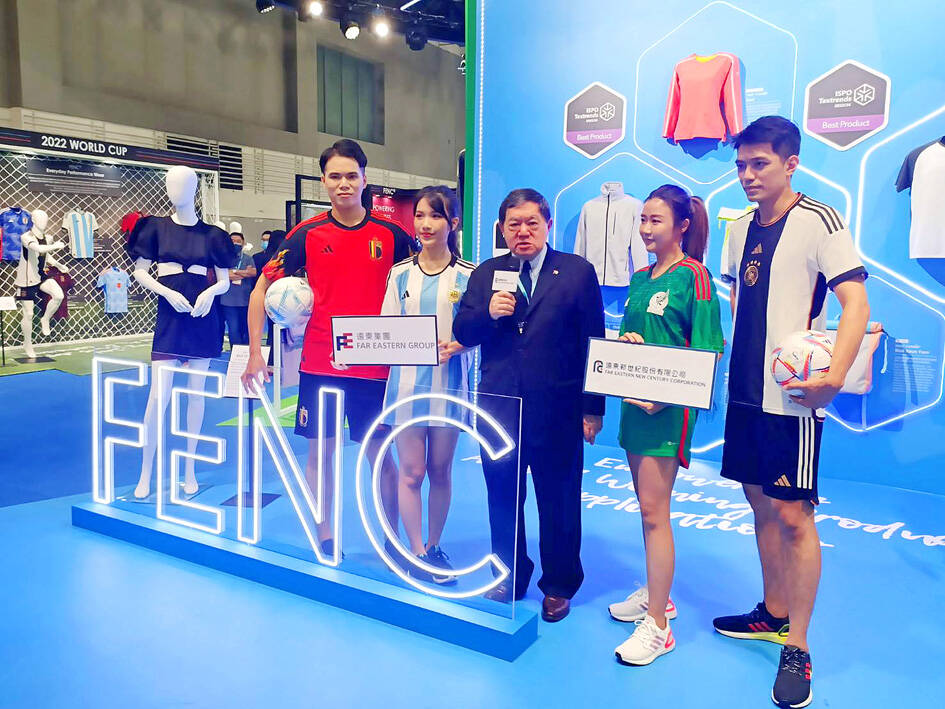More Taiwanese textile manufacturers are joining the trend to develop recycled products as the EU pushes the implementation of its “Strategy for Sustainable and Circular Textiles” in 2024, and the global textile sector targets a 45 percent reduction in carbon emissions by 2030.
Several local firms, which displayed environmentally friendly products at the Taipei Innovative Textile Application Show earlier this month, have followed in the footsteps of other global brands to incorporate environmental, social and corporate governance principles into their business operations in response to the UN’s Sustainable Development Goals.
The companies include Far Eastern New Century Corp (FENC, 遠東新世紀), Shinkong Synthetic Fibers Corp (新光合成纖維), Lealea Enterprise Co (力麗), Zig Sheng Industrial Co (集盛實業) and Formosa Taffeta Co (福懋興業), according to the trade show’s organizer, the Taiwan Textile Federation.

Photo: Huang Hao-chen, Taipei Times
Yuanta Securities Investment and Consulting Co (元大投顧) said in a note on Thursday that recycled polyethylene terephthalate (R-PET) demand has been increasing, with prices rising three times higher than those of virgin materials, as global brands such as Nike Inc and Adidas AG have pledged to use sustainable and recycled materials for their products.
R-PET is made mainly from plastic bottles, which are then made into a resin to be used in the production of textiles. The world’s three largest R-PET suppliers are Thailand-based Indorama Ventures Holdings LP, Taiwan’s Far Eastern New Century and Mexico-listed Alpek SAB de CV, Yuanta said.
To meet strong demand, Indorama plans to expand its R-PET capacity by 94 percent to 750,000 tonnes by 2025, from 387,000 tonnes, while Far Eastern is looking to increase its capacity by 169 percent to 870,000 tonnes from 324,000 tonnes over the same period, while also launching a plastic bottle recycling project with convenience stores in Japan and Taiwan, Yuanta said.
“FENC has focused on research and development for eco-friendly materials for years. It supplies multiple PET, textile and apparel products for international brands,” Yuanta analysts led by Lisa Chen (陳玫芬) said in the note.
The Taipei-based company has been supplying R-PET for Nike’s sports jerseys for national teams for more than 10 years.
FENC also used plastic bottles retrieved from the sea to produce sports shoes for Adidas in 2015, and is to extend the collaboration to sportswear this year.
The two companies are working to provide tear-resistant sports jerseys for nine national teams at this year’s FIFA World Cup in Doha, Qatar, as the shirts are moisture-wicking and suitable for sports involving collision, Yuanta said.
Supplying Lululemon Athletica Inc and Inditex SA’s Zara brand, FENC used recycled polyester chips in their products this year, which would also be adopted for their products to be launched next year, it said.
Shinkong Synthetic, Lealea and Zig Sheng purchase PET bottle flakes to make R-PET, which is used to manufacture recycled polyester fiber.
Formosa Taffeta purchases recycled polyester fiber to make fabric, with R-PET accounting for 50 percent of its total PET shipments, while used fishing nets and oyster ropes make up 20 percent of its total nylon shipments, Yuanta said.
“Taiwanese suppliers should continue to benefit from the eco-friendly approach of apparel brands like Nike, Adidas and Lululemon,” Yuanta analysts said.

SELL-OFF: Investors expect tariff-driven volatility as the local boarse reopens today, while analysts say government support and solid fundamentals would steady sentiment Local investors are bracing for a sharp market downturn today as the nation’s financial markets resume trading following a two-day closure for national holidays before the weekend, with sentiment rattled by US President Donald Trump’s sweeping tariff announcement. Trump’s unveiling of new “reciprocal tariffs” on Wednesday triggered a sell-off in global markets, with the FTSE Taiwan Index Futures — a benchmark for Taiwanese equities traded in Singapore — tumbling 9.2 percent over the past two sessions. Meanwhile, the American depositary receipts (ADRs) of Taiwan Semiconductor Manufacturing Co (TSMC, 台積電), the most heavily weighted stock on the TAIEX, plunged 13.8 percent in

A wave of stop-loss selling and panic selling hit Taiwan's stock market at its opening today, with the weighted index plunging 2,086 points — a drop of more than 9.7 percent — marking the largest intraday point and percentage loss on record. The index bottomed out at 19,212.02, while futures were locked limit-down, with more than 1,000 stocks hitting their daily drop limit. Three heavyweight stocks — Taiwan Semiconductor Manufacturing Co (TSMC, 台積電), Hon Hai Precision Industry Co (Foxconn, 鴻海精密) and MediaTek (聯發科) — hit their limit-down prices as soon as the market opened, falling to NT$848 (US$25.54), NT$138.5 and NT$1,295 respectively. TSMC's

ASML Holding NV, the sole producer of the most advanced machines used in semiconductor manufacturing, said geopolitical tensions are harming innovation a day after US President Donald Trump levied massive tariffs that promise to disrupt trade flows across the entire world. “Our industry has been built basically on the ability of people to work together, to innovate together,” ASML chief executive officer Christophe Fouquet said in a recorded message at a Thursday industry event in the Netherlands. Export controls and increasing geopolitical tensions challenge that collaboration, he said, without specifically addressing the new US tariffs. Tech executives in the EU, which is

In a small town in Paraguay, a showdown is brewing between traditional producers of yerba mate, a bitter herbal tea popular across South America, and miners of a shinier treasure: gold. A rush for the precious metal is pitting mate growers and indigenous groups against the expanding operations of small-scale miners who, until recently, were their neighbors, not nemeses. “They [the miners] have destroyed everything... The canals, springs, swamps,” said Vidal Britez, president of the Yerba Mate Producers’ Association of the town of Paso Yobai, about 210km east of capital Asuncion. “You can see the pollution from the dead fish.